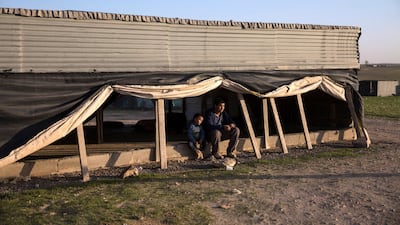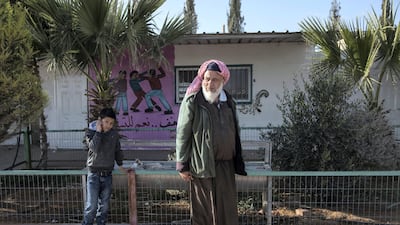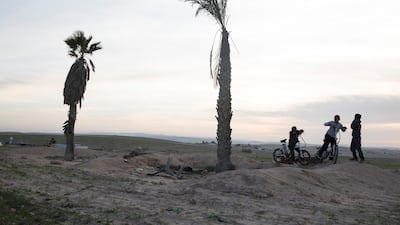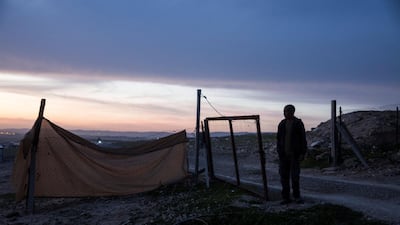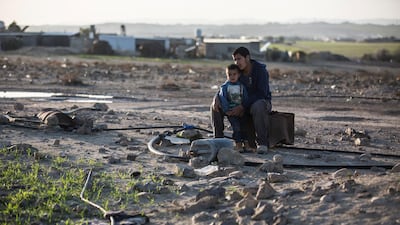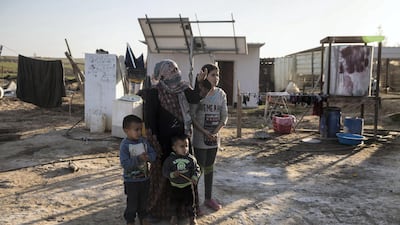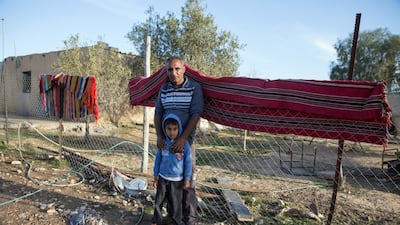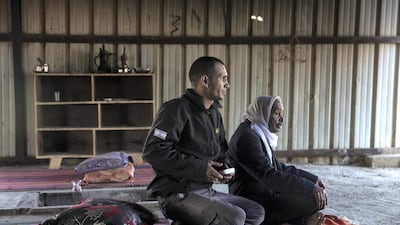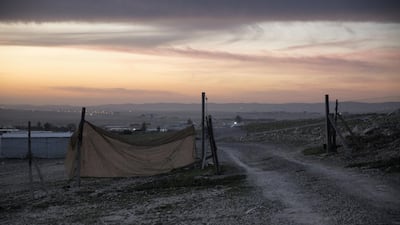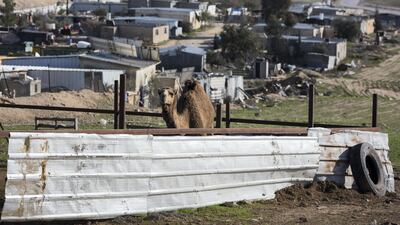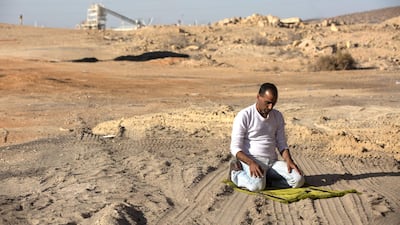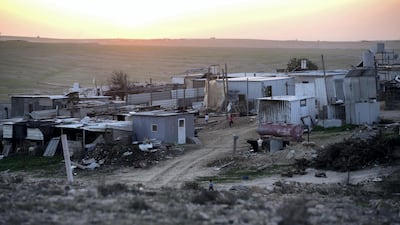To visitors, Al Poraa may not seem much. Clusters of grey one-storey concrete homes with corrugated iron roofs spread across a flat, rocky expanse. What lies under the village soil, however, could be the undoing of the thousands of Bedouin Arabs who live here.
The land, in the Negev desert in southern Israel, is earmarked for a phosphate mine. Permission was granted last month despite objections from health officials that it would pose a danger to humans. Most of the discussions about who stands to suffer have focused on the Jewish town of Arad, 3 kilometres away, rather than the people of Al Poraa. Other nearby Bedouin communities of Al Zarura, Al Azeh and Qatamat also stand to be severely affected, according to a paper by the Israeli planning rights group Bimkom and Adalah, who advocate of behalf of the Arab minority.
"They haven't asked for our opinions," Yossef Kabouh, head of the local residents committee, said of the government. "They don't take us into account. You can't come and decide there will be a mine without talking to people. They are presenting us with a fait accompli that means the end of Al Poraa."
Phosphate from the mine would be used in fertilisers, laundry detergent, pesticides and drugs.
The mine faces a court challenge and needs approval of a more detailed plan. Kabouh and other residents say their families have been on their land since Palestine was ruled by the Ottoman Turks, yet Israel does not recognise their ownership.
______________
Read more:
The Bedouin village caught up in Israeli settlement battle
Negev Bedouin face Jewish settlers, destruction of farmland
Hundreds join march for Bedouin rights in Israel
______________
A 2014 study by an independent American specialist commissioned by the government found that phosphate mining would increase the level of toxic particles in the air and could cause higher rates of respiratory and heart diseases. Rotem Amfert, the subsidiary of the Israel Chemicals Corporation that would carry out the work, disputes that there is a health problem, saying the mine will comply with Israel's clean air law and be appropriately supervised. The proposed mine for is the only "realistic phosphate reserve in the state of Israel," according to Rotem Amfert.
Throughout the Negev, Israeli policy is to use the threat and practice of home demolitions to move the Bedouin from their unrecognised villages into crowded townships. In 2009 the government took what Al Poraa residents and planning groups thought was a step that would make them an exception: it announced that a town to be named Al Foraa would be constituted and a planner subsequently met with locals to discuss details. But Kabouh said the talks were halted in 2011 with government officials saying they could not set the borders of Al Poraa until they know the boundaries of the phosphate mine. So no plan was drawn up for the village, making it impossible to build legally. In 2017 alone, dozens of homes were demolished in Al Poraa, Kabouh said.
Now, as the mining plan moves ahead, a depressing reality is emerging: all the homes in Al Poraa and some in the nearby villages are to be vacated. Some 8,000 Bedouin are to be moved into newly constructed homes on one tenth of the area they formerly inhabited while 2,000-3,000 more will be relocated to the nearby town of Kuseifa and elsewhere, according to Yair Maayan, head of the Authority for Development and Settlement of the Bedouin. The precise location of the new Al Foraa has yet to be decided, he said. But what is clear is that the area of the mine and a 1km-perimeter around it will be entirely cleared of Bedouin.
"We intend to concentrate the settlement, to place it into a given area," Maayan said. He maintained that this is being done with no connection to the plans for the mine. He said the authority has already met with families to persuade them to move. "I can't say that 100 per cent agree, but in general there are agreements," he said.
That is news to Kabouh and other residents interviewed by The National, who said they refuse to leave their land or move even a few kilometres away.
"We won't agree to it. This is our land," said Omar Kashchara, 23, who mixes cement for a living.
"My grandfather who is about 90 lived here when he was a child before the state of Israel was established. This is our land, we are tied to it and we won't leave. Even if they demolish our home, we won't leave. We'll build again."
Burhan Mohammed, 60, who had come to pray in a small mosque located in Al Foraa's elementary school, said: "There are other places to mine phosphates. Why do it in the middle of people?"
He is pinning his hopes on people in Arad also opposing the plan. A joint protest of Bedouin and Jewish Israelis from Arad is planned for Thursday.
The Bedouin, the poorest and most marginalised group in Israeli society, are often victims of a state seemingly bent on driving them off their lands — even when there are no phosphates at stake. But in Al Poraa the economic interests behind the mine appear to be dominating the government's thinking, given that objections from Israeli Jews and the health ministry are being sidelined.
Dov Khenin, a member of Israel's parliament, the Knesset says that the government is acting on behalf of powerful business interests instead of looking after its citizens. "What is human life worth when there are profits at stake and money to be made?" he said.
